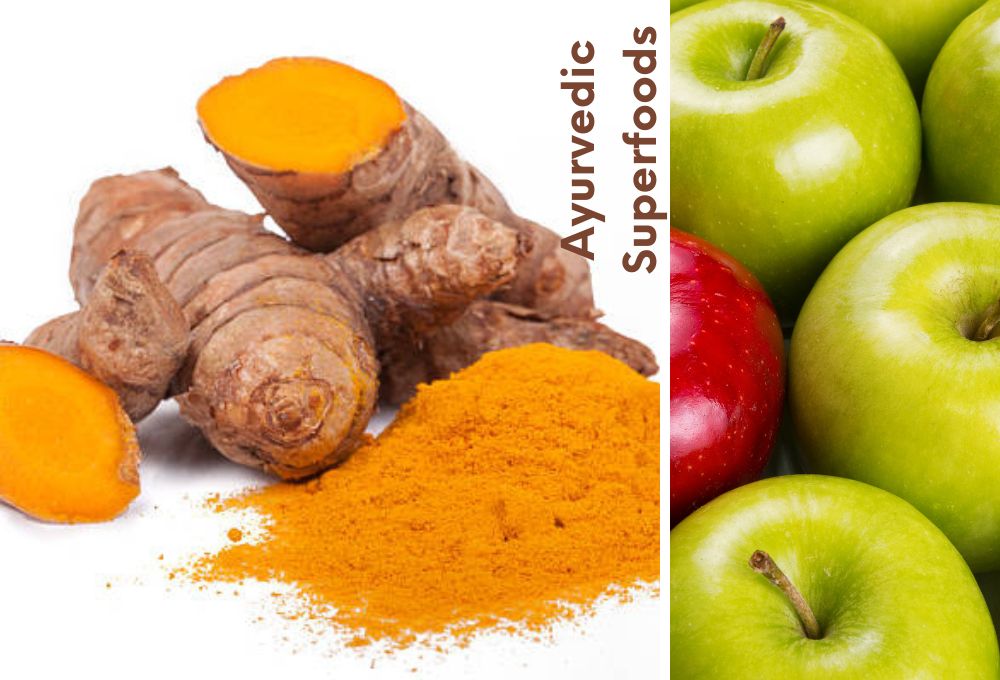
Discover the 7 Ayurvedic Superfoods That Revolutionize Your Well-being!
Ayurvedic Superfoods In the realm of health and wellness, the quest for holistic solutions to improve well-being has led many to explore the time-tested wisdom of Ayurveda. This ancient Indian system of medicine places a strong emphasis on balancing mind, body, and spirit through natural remedies and practices. Among the jewels of Ayurveda are its superfoods, packed with not only nourishment but also transformative power. In this comprehensive guide, we invite you to embark on a journey of discovery as we unveil the seven Ayurvedic superfoods that have the potential to revolutionize your well-being.
1. Turmeric – The Golden Elixir of Life
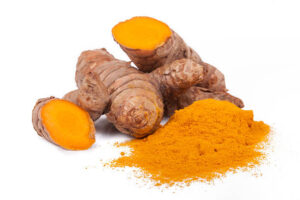
Turmeric, scientifically known as Curcuma longa, is a vibrant yellow spice that has been a cornerstone of Ayurvedic medicine for centuries. Its rich colour is derived from curcumin, the compound responsible for most of its remarkable health benefits. Let’s explore how this golden spice can truly revolutionize your well-being.
The Power of Curcumin
- At the heart of turmeric’s healing properties lies curcumin, a powerful anti-inflammatory and antioxidant compound. This bioactive ingredient is what sets turmeric apart as a superfood. Curcumin has been extensively studied for its potential to combat chronic inflammation, which is at the root of many modern diseases, including heart disease, cancer, and various degenerative conditions.
Alleviating Joint Pain
- One of the most celebrated uses of turmeric is its ability to alleviate joint pain and arthritis symptoms. The anti-inflammatory properties of curcumin can help reduce swelling and pain, providing much-needed relief to those suffering from joint disorders. Many individuals have found that incorporating turmeric into their daily regimen has led to increased mobility and a significant improvement in their quality of life.
Supporting Digestive Health
- Ayurveda places great importance on digestive health, considering it the cornerstone of overall well-being. Turmeric plays a key role in this aspect of Ayurveda. It stimulates bile production, which aids in the digestion of fats. Additionally, its anti-inflammatory properties can soothe an irritated digestive tract, making it beneficial for those with conditions like irritable bowel syndrome (IBS).
Antioxidant Protection
- In the battle against free radicals and oxidative stress, curcumin acts as a powerful ally. Oxidative stress can damage cells and DNA, contributing to ageing and various diseases. By neutralizing free radicals, curcumin helps protect your body from these harmful effects, promoting longevity and vitality.
Brain Health and Cognitive Function
- Emerging research suggests that curcumin may have a positive impact on brain health and cognitive function. It has the potential to cross the blood-brain barrier, which means it can directly affect brain cells. Some studies indicate that curcumin may help delay or even reverse brain diseases and age-related decreases in brain function.
How to Incorporate Turmeric into Your Diet
- Now that we’ve explored the many benefits of turmeric, you might be wondering how to make it a part of your daily routine. Here are a few ideas:
- Turmeric Tea: Brew a soothing cup of turmeric tea by simmering turmeric powder or grated fresh turmeric in hot water. You can enhance the flavour with a dash of honey and a squeeze of lemon.
- Golden Milk: Prepare a comforting golden milk by combining turmeric, milk (or a dairy-free alternative), and a pinch of black pepper. Black pepper enhances curcumin absorption.
- Spice Up Your Meals: Add turmeric to your savoury dishes, such as curries, stir-fries, and soups. It not only imparts a delightful flavour but also provides a health boost.
2. Ashwagandha – The Stress Buster
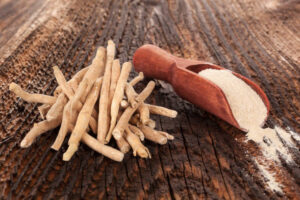
The Adaptogenic Powerhouse
- Ashwagandha, scientifically known as Withania somnifera, is an ancient herb with a rich history in Ayurvedic medicine. Its name translates to “smell of horse,” signifying both its distinct odour and its traditional belief in conferring the strength and vigour of a stallion. However, it’s Ashwagandha’s adaptogenic properties that truly set it apart.
Stress Reduction and Cortisol Regulation
- In our modern, fast-paced lives, stress has become an almost constant companion. Ashwagandha steps in as a natural stress reliever by regulating cortisol, often referred to as the “stress hormone.” Elevated cortisol levels can lead to a range of health issues, including anxiety, insomnia, and even weight gain. Ashwagandha helps bring cortisol levels back into balance, promoting a state of calm and relaxation.
Improved Mental Clarity
- Beyond stress reduction, Ashwagandha has a remarkable impact on mental clarity and cognitive function. It enhances memory and cognitive performance, making it a valuable tool for those seeking mental sharpness. Whether you’re facing the challenges of a demanding career or simply want to stay mentally agile as you age, Ashwagandha can be a game-changer.
Boosting Energy Levels
- While Ashwagandha is known for its calming effects, it paradoxically can also boost energy levels. It helps the body adapt to stress and fatigue, providing a sustainable source of vitality. This makes it an ideal choice for those dealing with the draining effects of chronic stress or fatigue.
Immune Support
- Ashwagandha’s immune-boosting properties should not be overlooked. A robust immune system is vital for overall health, and Ashwagandha helps strengthen your body’s defences against infections and illnesses. It’s especially valuable during cold and flu seasons when the immune system may need an extra boost.
How to Incorporate Ashwagandha into Your Routine
- Incorporating Ashwagandha into your daily regimen is easy, thanks to its availability in various forms, including capsules, powders, and tinctures. Here are some practical ways to enjoy the benefits of this remarkable herb:
- Ashwagandha Supplements: Capsules or tablets offer a convenient way to ensure you’re getting a consistent dose of Ashwagandha daily.
- Ashwagandha Tea: Some prefer to enjoy Ashwagandha as a soothing tea. Simply steep Ashwagandha powder or dried root in hot water and savour its earthy flavour.
- Tinctures: Ashwagandha tinctures allow for easy customization of your dosage. Add a few drops to your favourite beverage or take it sublingually.
- Ashwagandha Recipes: Get creative by incorporating Ashwagandha into recipes like smoothies, energy balls, or even savoury dishes. Its mild, earthy taste complements a variety of flavours.
3. Triphala – The Digestive Dynamo
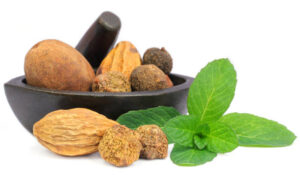
The Three-Fold Power
- Triphala, which translates to “three fruits,” combines the unique properties of amla (Indian gooseberry), bibhitaki (Bahera), and haritaki (Harada) to create a potent digestive tonic. Each fruit contributes to Triphala’s remarkable digestive benefits, making it a true dynamo in the world of Ayurveda.
Promoting Healthy Digestion
- A cornerstone of Ayurvedic wisdom is the belief that good health begins with a well-functioning digestive system. Triphala excels in this regard. It gently cleanses and detoxifies the digestive tract, helping to remove toxins and waste buildup. This not only alleviates digestive discomfort but also supports the body’s ability to absorb essential nutrients from the foods you consume.
Alleviating Constipation
- Triphala is particularly beneficial for those dealing with constipation. Its mild laxative properties help soften stools and encourage regular bowel movements. Unlike harsh chemical laxatives, Triphala works naturally with your body, promoting long-term digestive regularity.
Nourishing the Gut
- While Triphala is known for its cleansing effects, it also nourishes the digestive system. It soothes and strengthens the intestinal lining, promoting optimal gut health. This is especially valuable for individuals dealing with conditions like leaky gut syndrome or irritable bowel syndrome (IBS).
Antioxidant Protection
- Triphala is not limited to digestive benefits alone. It’s also a rich source of antioxidants, which combat free radicals and oxidative stress. By reducing cellular damage, Triphala supports overall health and longevity.
How to Incorporate Triphala into Your Routine
- Triphala is available in various forms, including powders, capsules, and tablets. Here’s how you can easily incorporate it into your daily routine:
- Triphala Powder: Mix a teaspoon of Triphala powder into a glass of warm water and drink it in the morning or evening. You can also add honey for flavour.
- Triphala Capsules or Tablets: If you prefer a convenient option, consider taking Triphala in capsule or tablet form. Follow the recommended dosage instructions on the product label.
- Triphala Tea: Some brands offer Triphala tea bags, making it easy to enjoy its benefits as a warm beverage.
- Cooking: Triphala can also be added to certain recipes, such as porridge or smoothies, for a nutritious twist.
4. Ghee – Liquid Gold for Health

The Elixir of Ayurveda
- Ghee, or clarified butter, holds a revered position in Ayurvedic tradition, and rightfully so. This golden substance is more than just a culinary delight; it’s a powerhouse of health benefits waiting to be explored.
The Clarification Process
- Ghee is made by simmering butter, which separates the milk solids from the pure butterfat. This meticulous clarification process not only enhances its flavour but also transforms it into a substance that’s easy to digest and brimming with nutrients.
Digestive Powerhouse
- Ayurveda places a strong emphasis on proper digestion as the foundation of good health. Ghee plays a pivotal role in supporting this digestive harmony. It lubricates the digestive tract, promoting smooth digestion and the assimilation of nutrients from your food. Its gentle nature makes it suitable for all constitutions, or doshas, in Ayurveda.
Immune Boosting Properties
- Ghee is not just a food; it’s a medicine in its own right. Its rich nutrient profile includes essential fatty acids, vitamins, and minerals that nourish the body and support immune function. Regular consumption of ghee can help fortify your body’s defences against infections and illnesses.
Brain Fuel and Nervous System Support
- Ghee is often referred to as “brain food” in Ayurveda. It contains important fatty acids like omega-3 and omega-9, which are essential for brain health. These fats nourish the brain and nervous system, enhancing cognitive function and mental clarity. In Ayurvedic practice, ghee is used to promote ojas, the subtle essence that supports vitality and overall well-being.
Anti-Inflammatory Benefits
- Chronic inflammation is a root cause of many modern diseases. Ghee contains butyric acid, a short-chain fatty acid with anti-inflammatory properties. Regular consumption of ghee can help reduce inflammation in the body, potentially lowering the risk of chronic diseases.
Cooking with Ghee
- Ghee is incredibly versatile in the kitchen. Its high smoke point makes it suitable for various cooking methods, including sautéing, frying, and even baking. It adds a rich, nutty flavour to dishes and can replace butter or cooking oil in most recipes.
Incorporating Ghee into Your Diet
- To enjoy the health benefits of ghee, you can:
- Cook with Ghee: Substitute ghee for butter or oil in your favourite recipes to enhance flavour and nutrition.
- Ghee in Coffee or Tea: Some people enjoy adding a teaspoon of ghee to their morning coffee or tea, creating a creamy and satisfying beverage.
- Drizzle on Veggies: Drizzle melted ghee over steamed vegetables or popcorn for a delectable twist.
- Ghee with Rice: Mix ghee with rice for a simple and nutritious side dish.
5. Moringa – The Nutrient Powerhouse
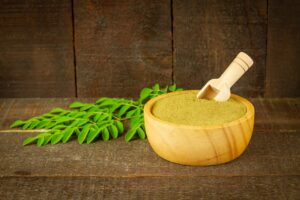
The Green Superfood
- Moringa, scientifically referred to as Moringa oleifera, is often hailed as the “drumstick tree” or the “miracle tree.” This superfood lives up to its reputation by offering a wealth of essential nutrients and health benefits.
Nutrient-Rich Leaves
- The leaves of the Moringa tree are the most celebrated part of this plant. They are packed with an impressive array of vitamins, minerals, and antioxidants. Here are some key nutrients found in Moringa leaves:
- Vitamins: Moringa leaves are rich in vitamins, including vitamin A, vitamin C, vitamin E, and various B vitamins. Vitamin A is essential for eye health, while vitamin C boosts the immune system and supports healthy skin.
- Minerals: Moringa provides essential minerals such as calcium, potassium, iron, and magnesium. Calcium is crucial for strong bones, while iron helps prevent anaemia.
- Antioxidants: Moringa leaves contain powerful antioxidants like quercetin, chlorogenic acid, and beta-carotene. These antioxidants combat free radicals and oxidative stress, reducing the risk of chronic diseases.
Promoting Skin Health
- The nutrient profile of Moringa makes it a potent supporter of radiant skin. Its vitamin E content nourishes the skin and helps protect it from the damaging effects of UV rays. Moringa oil, extracted from the seeds, is a popular ingredient in skincare products due to its moisturizing and anti-ageing properties.
Supporting Cardiovascular Health
- Moringa has shown promise in promoting cardiovascular health. It can help lower cholesterol levels, reducing the risk of heart disease. Its anti-inflammatory and antioxidant properties also support overall heart health.
Managing Inflammation
- Chronic inflammation is at the root of many diseases. Moringa’s anti-inflammatory properties help combat inflammation in the body, potentially reducing the risk of conditions like arthritis and chronic pain.
How to Incorporate Moringa into Your Diet
- Moringa can be enjoyed in various forms:
- Moringa Powder: This fine green powder can be added to smoothies, juices, or even soups for a nutritional boost.
- Moringa Capsules: For those looking for a convenient option, Moringa is available in capsule form, making it easy to incorporate into your daily routine.
- Moringa Tea: Some brands offer Moringa tea bags, providing a soothing and nutritious beverage option.
- Fresh Leaves: If you have access to fresh Moringa leaves, they can be used in salads, stir-fries, or as a garnish for various dishes.
6. Tulsi – The Queen of Herbs

Sacred and Revered
- Tulsi, scientifically known as Ocimum sanctum, is a sacred herb in India and holds a special place in both Ayurvedic and traditional medicine. It’s often grown in households and temples, where it’s considered a symbol of purity and divinity.
Adaptogenic Elegance
- Tulsi is classified as an adaptogen, a category of herbs that help the body adapt to stress and maintain balance. This quality is at the heart of Tulsi’s many health benefits.
Stress Reduction
- One of Tulsi’s primary claims to fame is its ability to reduce stress and anxiety. It helps regulate the production of stress hormones like cortisol, creating a sense of calm and relaxation. A warm cup of Tulsi tea is a soothing remedy for a frazzled mind.
Immune Support
- Tulsi is a potent immunomodulator, meaning it helps regulate the immune system’s activity. It can enhance the body’s defence mechanisms, making it more resilient to infections and illnesses. It’s particularly useful during the cold and flu season.
Respiratory Health
- Tulsi has been used for centuries to alleviate respiratory issues. Its anti-inflammatory and antimicrobial properties make it effective in managing conditions like coughs, bronchitis, and asthma. Tulsi leaves, when consumed or inhaled as steam, can provide relief from respiratory discomfort.
Balancing Blood Sugar
- Research suggests that Tulsi may help stabilize blood sugar levels. It can be beneficial for individuals dealing with diabetes or those looking to manage their blood sugar as a preventive measure.
Radiant Skin
- Tulsi is not just for internal health; it also promotes radiant skin. Its antioxidants help combat free radicals, delaying the signs of ageing. Tulsi-based skincare products are known for their ability to cleanse and rejuvenate the skin.
How to Enjoy Tulsi
- Tulsi is versatile and can be consumed in various forms:
- Tulsi Tea: Enjoy the calming effects of Tulsi by steeping its leaves in hot water. You can find Tulsi tea blends in many flavours, including lemon, ginger, and mint.
- Tulsi Capsules: If you prefer a convenient option, Tulsi is available in capsule form, providing a standardized dosage.
- Tulsi Drops: Tulsi extracts in liquid form can be added to beverages or taken directly.
- Fresh Leaves: If you have access to fresh Tulsi leaves, you can chew them for their myriad health benefits.
7. Amalaki – The Fruit of Immortality

A Nutrient-Rich Gem
- Amalaki, scientifically known as Phyllanthus emblica, is a small, round fruit that grows on the Indian gooseberry tree. It’s celebrated for its exceptional nutrient density and a wide range of health benefits.
A Vitamin C Powerhouse
- Amalaki is renowned for its extraordinarily high vitamin C content, surpassing even that of oranges. Vitamin C is a potent antioxidant that plays a crucial role in immune function, skin health, and overall vitality. Regular consumption of Amalaki can help boost your immune system, making it more resilient against infections.
Skin Health and Radiance
- The antioxidant properties of Amalaki extend to promoting healthy and radiant skin. Vitamin C helps combat free radicals that can lead to premature ageing. Amalaki-based skincare products are popular for their ability to improve skin texture and reduce blemishes.
Promoting Hair Health
- Amalaki is also beneficial for hair health. Its rich vitamin C content strengthens hair follicles, reduces hair loss, and promotes healthy, lustrous locks. Amalaki oil is often used in hair treatments to nourish the scalp and improve hair texture.
Digestive Aid
- In Ayurveda, Amalaki is valued for its ability to support digestion. It helps balance the digestive fire (Agni) and can alleviate digestive discomforts, such as acidity and indigestion. It’s particularly useful for those with a Pitta constitution in Ayurveda.
Rejuvenation and Longevity
- Amalaki is considered a rejuvenating herb in Ayurveda. It’s believed to promote longevity and vitality by nourishing the body’s tissues. Regular consumption of Amalaki is thought to help delay the effects of ageing and maintain overall well-being.
How to Enjoy Amalaki-
- Amalaki can be enjoyed in various forms:
- Fresh Fruit: If you have access to fresh Amalaki fruit, you can eat it as is or incorporate it into fruit salads and chutneys.
- Amalaki Powder: Amalaki powder is a convenient way to enjoy its benefits. You can mix it with water, juice, or yoghurt.
- Amalaki Capsules: For those looking for a standardized dosage, Amalaki is available in capsule form.
- Amalaki Supplements: You can also find Amalaki in various supplement blends designed to support immune health and overall well-being.
conclusion-:
we’ve embarked on a journey through the world of Ayurvedic superfoods, each with its unique set of health benefits and transformative potential. From the “Golden Elixir of Life” that is Turmeric to the “Queen of Herbs” Tulsi, and from the “Liquid Gold for Health” that is Ghee to the “Fruit of Immortality” Amalaki, these superfoods offer a holistic approach to well-being.
They are not just culinary delights; they are nature’s gifts to us, packed with essential nutrients, antioxidants, and medicinal properties. Incorporating these superfoods into your daily routine can have a profound impact on your health, from supporting digestion and reducing stress to boosting immunity and promoting radiant skin.
As with any dietary changes or supplements, it’s wise to consult with a healthcare professional, especially if you have specific health concerns or are taking medications. Embrace these superfoods as allies on your wellness journey, and experience their transformative power in revolutionizing your well-being.

